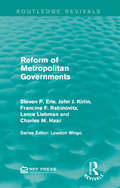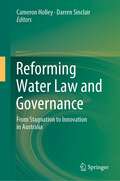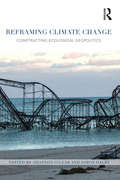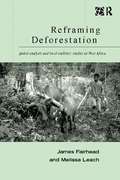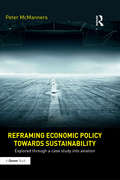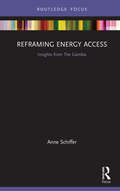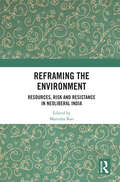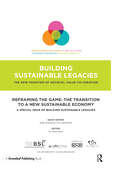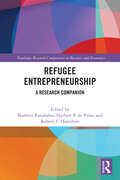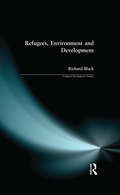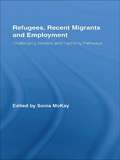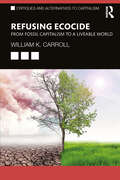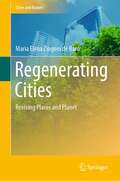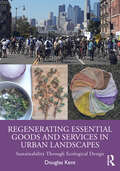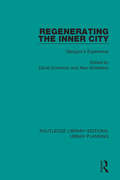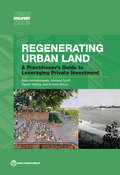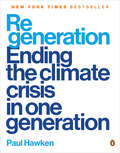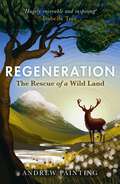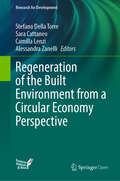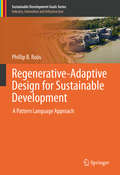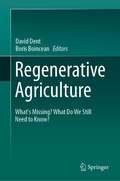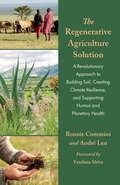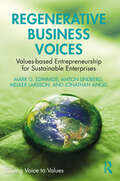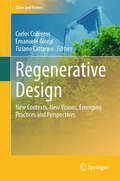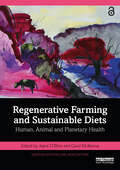- Table View
- List View
Reform of Metropolitan Governments (Routledge Revivals)
by Steven P. Erie Charles M. Haar John J. Kirlin Francine F. Rabinovitz Lance LiebmanOriginally published in 1972, this study aims to explore governmental interaction with people and publics interests and institutions in Metropolitan America. These papers discuss issues of how governance can be improved and the federal role in Metropolitanism as well as suggesting ways in which political reform can help. This title will be of interest to students of Environmental Economics and professionals.
Reforming Water Law and Governance: From Stagnation To Innovation In Australia
by Cameron Holley Darren SinclairThis book identifies the most effective water policy tools and innovations, and the circumstances that foster their successful implementation by taking a comparative look at a world-leading ‘laboratory’ of water law and governance: Australia. In particular, the book analyses Australia’s 20-year experience implementing a hybrid governance system of markets, hierarchical regulation, and collaborative integrated water planning. Australia is acknowledged as a world leader in water governance reform, and an examination of its relatively mature water law and governance system has great significance for many international academics and jurisdictions. This book synthesises practical lessons and theoretical insights from Australia, as well as recommendations from comparative analysis with countries such as the United States to provide useful guidance for policymakers and scholars seeking to apply water instruments in a wide range of policy contexts. The book also advances our understanding of water and broader environmental governance theory and is a valuable reference for scholars, researchers and students working in law, regulation and governance studies – especially in the field of water and environmental law.
Reframing Climate Change: Constructing ecological geopolitics
by Shannon O'Lear Simon Dalby"Change the system, not the climate" is a common slogan of climate change activists. Yet when this idea comes into the academic and policy realm, it is easy to see how climate change discourse frequently asks the wrong questions. Reframing Climate Change encourages social scientists, policy-makers, and graduate students to critically consider how climate change is framed in scientific, social, and political spheres. It proposes ecological geopolitics as a framework for understanding the extent to which climate change is a meaningful analytical focus, as well as the ways in which it can be detrimental, detracting attention from more productive lines of thought, research, and action. The volume draws from multiple perspectives and disciplines to cover a broad scope of climate change. Chapter topics range from climate science and security to climate justice and literacy. Although these familiar concepts are widely used by scholars and policy-makers, they are discussed here as frequently problematic when used as lenses through which to study climate change. Beyond merely reviewing current trends within these different approaches to climate change, the collection offers a thoughtful assessment of these approaches with an eye towards an overarching reconsideration of the current understanding of our relationship to climate change. Reframing Climate Change is an essential resource for students, policy-makers, and anyone interested in understanding more about this important topic. Who decides what the priorities are? Who benefits from these priorities, and what kinds of systems or actions are justified or hindered? The key contribution of the book is the outlining of ecological geopolitics as a different way of understanding human–environment relationships including and beyond climate change issues.
Reframing Deforestation: Global Analyses and Local Realities: Studies in West Africa
by James Fairhead Melissa LeachThis study reviews how West African deforestation is represented and the evidence which informs deforestation orthodoxy. On a country by country basis (covering Sierra Leone, Liberia, Cote D'Ivoire, Ghana, Togo and Benin), and using historical and social anthropological evidence the authors evaluate this orthodox critically. Reframing Deforestation suggests that the scale of deforestation wrought by West African farmers during the twentieth century has been vastly exaggerated. The authors argue that global analyses have unfairly stigmatised West Africa and obscured its more sustainable, even landscape-enriching practices. Stessing that dominant policy approaches in forestry and conservation require major rethinking worldwide, Reframing Deforestation illustrates that more realistic assessments of forest cover change, and more respectful attention to local knowledge and practices, are necessary bases for effective and appropriate environmental policies.
Reframing Economic Policy towards Sustainability: Explored through a case study into aviation
by Peter McMannersIn a globalized world economy, delivering the aspirations of sustainability is proving to be difficult. Progress is held back by competing objectives within a complex interplay of factors. Finding solutions to the ‘wicked problem’ of sustainability seems to be beyond the reach of policy makers. Even if the political will can be found to deal with the prime challenges of the twenty-first century, ranging from climate change and resource depletion to persistent poverty and increasing inequity, what is to be done in terms of real-world policy is far from clear. Do we need more globalization; or has economic globalization gone too far in growing a global economy which will strip the planet bare? This book reports twin-track research which interweaves the intellectual argument over the future of the world economy intertwined with empirical research into the challenge of sustainability in aviation. Discussing the prime challenges of this century through the lens of the intractable policy stalemate in aviation, this book leads the reader to the identification of a new way forward. Whether the political will is forthcoming will continue to be subject to debate, but we now have a clear exposition of how to address the problem. The new paradigm presented in this book opens the way to considering radical transformations to make real progress with the sustainability agenda.
Reframing Energy Access: Insights from The Gambia (Routledge Focus on Environment and Sustainability)
by Anne SchifferThis book investigates energy access through the lens of everyday energy practices in the Gambian community of Kartong. Reframing Energy Access: Insights from The Gambia explores past, current and potential future modes of energy production and consumption to examine concepts such as energy leapfrogging and energy sufficiency. It argues that developments must be rooted in situated understanding of energy consumption to ensure sustainable and equitable access to modern energy services. Schiffer provides a uniquely long-term and holistic perspective into changing energy practices on the ground and the economic, political, environmental, technical and cultural factors that shape it. Translating insights of energy in The Gambian context into broader themes and recommendations, this book will be of great interest to policy makers, researchers and practitioners who work in the fields of energy access, energy policy, renewable energy transitions, as well as African and sustainable development in general.
Reframing the Environment: Resources, Risk and Resistance in Neoliberal India
by Manisha RaoThis volume unravels the underlying power relations that are masked in the present discourse of ecological sustainability and conflicts over natural resources. Current discussions on environment emphasise the use and abuse of the environment in various ways. This book looks at the inter-linkages of discourse, resources, risk and resistance in the contemporary neoliberal world. While exploring the experiences of neoliberalisation of nature in India, it brings out the intersections of conservation and management, science and gender, community politics and governance policies. The volume highlights the cultural politics of resistance from multiple sites and regions in India in the recent context (be it land, water, forest, flora or fauna or urban commons). It discusses the ways in which environmental issues have come up and been appropriated, while examining the role of the State and actors such as corporates, traders, consultants, ecotourism companies, green activists and consumers, and consequences of ‘green’ appropriation and the ‘growth’ story. The major themes of the volume are the interrelations of nature, culture and power; neoliberal governance and the environment; access to and use and management of land, natural resources and environment; community politics and livelihoods; marginalised groups and local communities; marketisation and the environment; and new forms of re-appropriation and resistance. This book will be of great interest to students and researchers in sociology, environmental studies, environmental history, environmental anthropology, political ecology, political science, geography, law and human rights, economics and development studies as well as to environmental activists, policy makers and those in media and journalism.
Reframing the Game: A Special Issue of Building Sustainable Legacies
by Mike Townsend Katrin MuffCapitalism is fast approaching the tipping point into a new sustainable economy that will allow people and the planet to prosper. Pieces of a jigsaw are coming together and bringing into focus a picture of a new, vibrant, attractive and sustainable economic operating system. This quiet revolution is underway - if we could only allow it to flourish.This Special Issue of Building Sustainable Legacies brings together key voices in business and academia that show us how to accelerate towards this tipping point by exploring the role that business in society, responsible education, leadership techniques and legal reform will have in shaping the new sustainable economy.Including contributions from Paul Polman, Katrin Muff, Beate Sjafjell and Gabriele Zedlmayer, this outstanding collection proposes leading insights and innovative solutions to the challenge of creating new economies that work for people and the planet.
Refugee Entrepreneurship: A Research Companion (Routledge Research Companions in Business and Economics)
by Ranabahu, Edited by NadeeraThis comprehensive volume explores the phenomenon of refugee entrepreneurship and advances the discussions and debates in the domain.The growing number of refugees across the world creates a compelling need to study the social and economic activities of refugees in different contexts, and to share experiences and debate how to better support refugee populations. This book covers academic, practical, and policy issues in refugee entrepreneurship, seeking to present the current status of research in this evolving field. The topics include how to identify and differentiate refugee entrepreneurship; refugees’ business practices; the personal, economic, and social values and impacts of refugee entrepreneurship; and the institutional support and role of ecosystems in facilitating refugee entrepreneurship. Future research directions are also outlined. This book provides scholars with the theoretical foundations and evidence base to advance refugee entrepreneurship research. Support agencies will learn from the experiences of others about the delivery of tailored support and policymakers will recognise the need for empathy and consistency in developing host country strategies for refugees.
Refugees, Environment and Development (Longman Development Studies)
by Richard BlackRefugees, Environment and Development is concerned with the complex interrelationships between forced migration, natural resource management and 'sustainable development'. The book challenges the growing rhetoric that refugees 'cause' environmental degradation, and that environmental decline is promoting a new wave of 'environmental refugees'. Drawing on examples from Africa, Asia and Latin America, as well as detailed case studies of the Rwandan emergency of 1994-96, and lesser known refugee movements to Guinea and Senegal in West Africa, the book argues against a neo-Malthusian view of the relationship between population, environment and migration. The author explores alternative approaches to the dynamic processes of social and environmental change in refugee situations.This is an ideal text for undergraduate and postgraduate students concerned with environment, development and migration studies, as well as policy-makers and practitioners in the field.
Refugees, Recent Migrants and Employment: Challenging Barriers and Exploring Pathways (Routledge Research in Population and Migration)
by Sonia McKayUpheavals in vast areas of the world have led to a growing number of international refugees, a significant proportion of which have made their way to the West. At the same time, economic and social pressures, together with skills and labour shortages, have encouraged the migration for work of millions of workers worldwide. Although there has been a constant media focus on these two groups, little is known about their labour market experiences. This collection examines the problems faced by refugees and recent migrants in accessing employment as well as the policy frameworks that address the labour market rights of refugees and economic migrants.
Refusing Ecocide: From Fossil Capitalism to a Liveable World (Critiques and Alternatives to Capitalism)
by William K. CarrollRefusing Ecocide: From Fossil Capitalism to a Liveable World provides a critical analysis of the central role of fossil capitalism in causing climate change and argues that only alternatives based upon democratic eco-socialism can prevent the deepening of the climate crisis.Employing three core concepts within historical materialism – capitalist accumulation, imperialism and hegemony – it locates the existential threat of our changing climate in the drive for increasing profit and growth, the domination of advanced capitalist states that strip resources and exploit cheap labour, and the consent to the capitalist way of life in the global North. With attention to the ways in which, powered by fossil fuels, capital has subjected the world to its predatory logic, this book charts this history and surveys the damage from the Industrial Revolution to today’s deep civilizational crisis, arguing that the market-based and purely technological solutions of ‘climate capitalism’ are too little, too late.A call for a multifaceted and multi-scalar shift away from capitalist accumulation, imperialism and class hegemony and instead towards democratic eco-socialism, it will appeal to scholars across the social sciences with interests in political and social theory, the environment and sustainability.
Regenerating Cities: Reviving Places and Planet (Cities and Nature)
by Maria Elena Zingoni de BaroThis book sets out the discussion on how cities can contribute solutions to some of the challenges the urbanised world is facing, such as the pressure of growing populations, mitigation of effects of, and adaptation to globally changing environmental, climate and public health conditions. Presenting a detailed explanation of the causes behind the current state of modern cities, the book advocates for a paradigm shift to improve the quality of life of ever-increasing urban inhabitants whilst nourishing the natural systems that sustain human and non-human life in the planet. Recognising the precious role that nature plays in the functioning of cities, it delves into the study of biophilic design and regenerative development. The book argues that these social-ecological design approaches can act as catalysts to develop conditions in urban settings that are beneficial for natural and human systems to thrive and flourish, both in ecosystem services and social-cultural systems. This is particularly relevant for the design of new quality precincts or the regeneration of degraded urban spaces to promote health, wellbeing and urban resilience. A framework is proposed to guide the process of thinking about, designing and building healthier, more liveable and resilient urban environments that raise the quality of life in cities. The method can be used by researchers, practitioners -urban designers, urban planners, architects and landscape architects- interested in developing their work within a social-ecological perspective. It can also be used by local governments and agencies to underpin policy making, and by educational institutions to prepare graduates with necessary skills to respond to current and future built environment challenges.
Regenerating Essential Goods and Services in Urban Landscapes: Sustainability Through Ecological Design
by Douglas KentHow do we provide for and nurture millions of people without destroying the planet in the process? Author Doug Kent, an environmental specialist, believes a vital element in the solution is recognizing that urban landscapes are an essential partner in everyone’s wellbeing. He argues that urban landscapes can and must work harder.Urban landscapes can provide part of our energy needs, help cool our buildings and public spaces, help us make the most of our precious water. They can also help combat air pollution and reduce the likelihood of allergies and asthma. They can provide landscape materials and even contribute to our timber supply. Doug also advocates turning landscapes into a food source, and/or a perfumery, pharmacy, soap shop, or craft store.Doug has over 12 years of research in this book. He has spent years doing literature reviews, and many more years concocting, consuming, crafting, distilling, propagating, retting, sawing, sowing, and weaving its many recommendations. He has also travelled the length and width of California many times to interview the people and businesses already doing this incredible work.Regenerating Essential Goods and Services is not a manifesto. It is a user’s manual. You are the creative and energetic force that will ultimately drive sustainability and regeneration. Let’s go.
Regenerating the Inner City: Glasgow's Experience (Routledge Library Editions: Urban Planning #10)
by David Donnison Alan MiddletonOriginally published in 1987, Regenerating the Inner City looks at the changes to Glasgow’s East End and how industrial closures and slum clearance projects have caused people to leave. This is reflected across the western world, and causes severe blows to cities where these industries are located. The book draws on Glasgow’s Eastern Area Renewal Scheme, the first big urban renewal project in Britain. The contributors to the volume come from a range of disciplines and form practical conclusions for policy-makers, and community activists. The book uses door-to-door surveys in Glasgow’s east end, and interviews with community groups to gain an authentic understanding of the issue.
Regenerating Urban Land: A Practitioner's Guide to Leveraging Private Investment
by Rana Amirtahmasebi Sameh Wahba Altman Mariana OrloffRegenerating Urban Land draws on the experience of eight case studies from around the world. The case studies outline various policy and financial instruments to attract private sector investment in urban regeneration of underutilized and unutilized areas and the requisite infrastructure improvements. In particular, each case study details the project cycle, from the scoping phase and determination of the initial amount of public sector investment, to implementation and subsequent leveraged private-sector funds. This manual analyzes rates of return on the investments and long-term financial sustainability. Regenerating Urban Land guides local governments to systematically identify the sequence of steps and tasks needed to develop a regeneration policy framework, with the participation of the private sector. The manual also formulates specific policies and instruments for expanding private sector participation; structuring effective administrative and legal frameworks; utilizing land readjustment/assembly methods; determining duration of contracts, adequate phasing, and timeline; and balancing the distribution of risk and sustainability measures.
Regeneration: Ending the Climate Crisis in One Generation
by Paul HawkenA radically new understanding of and practical approach to climate change by noted environmentalist Paul Hawken, creator of the New York Times bestseller DrawdownRegeneration offers a visionary new approach to climate change, one that weaves justice, climate, biodiversity, equity, and human dignity into a seamless tapestry of action, policy, and transformation that can end the climate crisis in one generation. It is the first book to describe and define the burgeoning regeneration movement spreading rapidly throughout the world. Regeneration describes how an inclusive movement can engage the majority of humanity to save the world from the threat of global warming, with climate solutions that directly serve our children, the poor, and the excluded. This means we must address current human needs, not future existential threats, real as they are, with initiatives that include but go well beyond solar, electric vehicles, and tree planting to include such solutions as the fifteen-minute city, bioregions, azolla fern, food localization, fire ecology, decommodification, forests as farms, and the number one solution for the world: electrifying everything. Paul Hawken and the nonprofit Regeneration Organization are launching a series of initiatives to accompany the book, including a streaming video series, curriculum, podcasts, teaching videos, and climate action software. Regeneration is the inspiring and necessary guide to inform the rapidly spreading climate movement.
Regeneration: The Rescue of a Wild Land
by Andrew PaintingIn 1995 the National Trust for Scotland acquired Mar Lodge Estate in the heart of the Cairngorms. Home to over 5,000 species, this vast expanse of Caledonian woodlands, subarctic mountains, bogs, moors, roaring burns and frozen lochs could be a place where environmental conservation and Highland field sports would exist in harmony. The only problem was that due to centuries of abuse by human hands, the ancient Caledonian pinewoods were dying, and it would take radical measures to save them. After 25 years of extremely hard work, the pinewoods, bogs, moors and mountains are returning to their former glory. Regeneration is the story of this success, featuring not only the people who are protecting the land and quietly working to undo the wrongs of the past, but also the myriad creatures which inspire them to do so. In addition, it also tackles current controversies such as raptor persecution, deer management and rewilding and asks bigger questions about the nature of conservation itself: what do we see when we look at our wild places? What should we see?
Regeneration of the Built Environment from a Circular Economy Perspective (Research for Development)
by Stefano Della Torre Sara Cattaneo Camilla Lenzi Alessandra ZanelliThis open access book explores the strategic importance and advantages of adopting multidisciplinary and multiscalar approaches of inquiry and intervention with respect to the built environment, based on principles of sustainability and circular economy strategies. A series of key challenges are considered in depth from a multidisciplinary perspective, spanning engineering, architecture, and regional and urban economics. These challenges include strategies to relaunch socioeconomic development through regenerative processes, the regeneration of urban spaces from the perspective of resilience, the development and deployment of innovative products and processes in the construction sector in order to comply more fully with the principles of sustainability and circularity, and the development of multiscale approaches to enhance the performance of both the existing building stock and new buildings. The book offers a rich selection of conceptual, empirical, methodological, technical, and case study/project-based research. It will be of value for all who have an interest in regeneration of the built environment from a circular economy perspective.
Regenerative-Adaptive Design for Sustainable Development: A Pattern Language Approach (Sustainable Development Goals Series)
by Phillip B. RoösIn this book, the author tests a regenerative-adaptive pattern language theory towards investigating the possibilities of a holistic, integrated design and planning method for sustainable development that incorporates the principles of regenerative design, as well as an adaptive pattern language that re-establishes our wholeness with nature, and considers the vulnerabilities of a changing landscape. The book examines an integral approach to contemporary theories of planning and design that explores the human-nature relationship patterns in social and spatial interconnections, between people and their natural environments. The interconnectedness of human and natural systems is used to scaffold possible solutions to address key environmental and sustainability issues that specifically address the need for patterns of behaviour that acknowledge the duality of ‘man and nature’. In 12 chapters, the book presents a holistic, regenerative-adaptive pattern language that encapsulates how communities can better appreciate landscape change under future climate effects, and acknowledges the importance to adapt to patterns of change of place and the environment and therefore inform the communities’ responses for sustainable development. The application of the regenerative-adaptive pattern language was tested along the Great Ocean Road region of the Victorian coast in Australia. The concluding chapters argues that for human settlements and cities to be resilient and sustainable, we must understand the interconnected patterns of human-built environments and natural systems, and how we function in a social-spatial dimension with these. The book is intended for practitioners and academic scholars with interest in sustainable development, regenerative design, pattern languages, biophilia, settlement planning, and climate change adaptation.
Regenerative Agriculture: What’s Missing? What Do We Still Need to Know?
by David Dent Boris BoinceanThe food system is our last coal-fired power station, our last diesel engine. This book is a trans-disciplinary approach to what needs to be done to make our food system sustainable and to regenerate soil and water resources, habitat, economy and society. The book brings back classical principles of agronomy and integrates economic, agro-ecological and social perspectives, drawing on a wealth of expertise on the political economy of the food system, Conservation Agriculture, and long-term field experiments. Regenerative agriculture builds on known knowns – like crop rotation, water and nutrient requirements, soil and water conservation, farm-gate prices, international trade and supply chains. It grapples with known unknowns – like weed, pest and disease control without agrochemicals, cover crops for profit as well as protection, mitigating and adapting to the climate crisis, resilience and tipping points in ecosystems, farming systems and societies, and how we can pay for imperative changes. Lastly, it acknowledges unknown unknowns – the things we are oblivious to but which we really must know – like how to liberate the ghettos of the mind inhabited by farmers, agronomists, politicians and societies.
The Regenerative Agriculture Solution: A Revolutionary Approach to Building Soil, Creating Climate Resilience, and Supporting Human and Planetary Health
by null Andre Leu null Ronnie Cummins&“Read this book to understand why you should care about regenerative agriculture. Until the public is better-informed and insists on sweeping changes to current agricultural policy . . . we will continue to degrade our planet and destabilize our climate. Leu and Cummins, through inspiring stories and solid science, show just how quickly we could turn that around.&”—Allan Savory, president, Savory Institute; chairman, Africa Centre for Holistic ManagementIs it possible that the solution to the global climate emergency lies in a &“waste&” agricultural product? The best-kept secret in today&’s world is that solutions to some of our most pressing issues—food insecurity, deforestation, overgrazing, water scarcity, rural poverty, forced migration—lie in adopting, improving, and scaling up organic and regenerative agriculture best practices.The Regenerative Agriculture Solution starts with the story of how two brothers—Jose and Gilberto Flores—are at the leading edge of this approach, pioneering the use of the previously discarded leaves of the prodigious agave plant to regenerate agricultural soils, reduce erosion, and improve water capture.When Ronnie Cummins, the cofounder of Organic Consumer Association (OCA) and Regeneration International, met the Flores brothers in 2019 and witnessed their revolutionary agave agroforestry system, he knew they were onto something important.Cummins had spent decades studying the potential and pitfalls of organic and regenerative agriculture and knew best practices when he saw them. He started to write a book about Flores&’s brother and other visionary people, such as Dr Vandana Shiva, Allan Savory, and John Liu, who started landscape-scale regeneration projects. The scientific data was even more convincing, suggesting that these projects—and others like it—could revolutionize how we understand the climate catastrophe.Sadly, Cummins passed away in April 2023, in the midst of working on the book. Not to leave this work unfinished, Ronnie&’s widow and OCA cofounder, Rose, called on their friend, colleague, and collaborator, Regeneration International&’s cofounder André Leu, to complete the work and place the Flores brothers&’ breakthroughs in the broader context of regenerative agriculture solutions to the world&’s many interlocking ecological crises.The result isThe Regenerative Agriculture Solution, a book that shows how regenerating our forests, rangelands, and farming ecosystems can cool our planet, restore the climate, and enrich our communities.
Regenerative Business Voices: Values-based Entrepreneurship for Sustainable Enterprises (Giving Voice to Values)
by Mark G. Edwards Anton Lindberg Melker Larsson Jonathan AngelThis is a book about the future of sustainability. Regenerative Business Voices: Values-based Entrepreneurship for Sustainable Enterprises tells the stories of four regenerative organizations and the people who have founded them and guided them towards sustaining futures.Regenerative sustainability recognizes the urgency of transforming organizations to reverse the unsustainable pathways we are currently on. Regenerative businesses do not simply do less harm, or produce zero emissions, or optimize the efficient use of natural resources; they also restore and enhance well-being in social and ecological systems. The stories presented here are analyzed using the business ethics approach called Giving Voice to Values (GVV). Through the application of GVV principles, we uncover the processes involved in how regenerative businesses develop and function, and gain insights into how business leaders voice their deep convictions, overcome silencing rationalizations, normalize their execution of personal choice, discover deep purpose in their work, and draw on their personal histories to create new ways of doing business. We present and analyze these cases to understand how and why expressing values can be so crucial in developing sustainable businesses, and to provide practical examples of how individuals can generate enthusiasm, counter objections, gain allies, and prepare for and practice conversations that help them move forward.The book offers managers and sustainability consultants a new way of understanding some of the central dynamics involved in business ethics and organizational change for sustainability. It will be immensely valuable to educators, business students, and practitioners interested in sustainability, environmental business ethics, and corporate social responsibility topics.
Regenerative Design: New Contexts, New Visions, Emerging Practices and Perspectives (Cities and Nature)
by Emanuele Giorgi Tiziano Cattaneo Carlos CobrerosThis book aims to provide bases for reasoning on what opportunities the regenerative approaches to urban-architectural design and development can bring to our territories and living systems (environment, society, city and learning). It collects research, experiences and considerations from experts that present innovations from different contexts, especially from the Latin-Mediterranean context. The goal of this book is to provide the reader with case studies, analysis and guidelines, resulting from scientific research from academia and practice. The book collects research focused on topics that are nowadays crucial to understand how to intervene in the complicated contexts of socio-environmental emergencies. These studies are organized into seven sections, discussing from the importance of new narrative facing future environmental challenges, to the appropriate methodologies and approaches for regenerative culture with systemic view. The book closes with outputs, dreams and hopes of regenerative design: challenges and opportunities to rewrite our alliance with the environment and to move forward our relation with the socio-environmental capital.
Regenerative Farming and Sustainable Diets: Human, Animal and Planetary Health (Earthscan Food and Agriculture)
by Joyce D’Silva Carol McKennaThis book makes the case for an urgent move away from industrial agriculture towards regenerative farming and the promotion of plant-based diets.How we produce, distribute and consume food are critical issues for the health and well-being of humans, animals and the environment. In order to develop a sustainable food system, this book argues for a radical change in farming and food consumption. Containing contributions from world renowned experts, this book promotes regenerative farming as the means to preserve planetary health, establish sustainable, healthy and secure diets and safeguard the welfare of animals. Chapters discuss broad ranging issues from climate change and biodiversity conservation to animal sentience and intensive farming, and the role of financial markets and food businesses. The book concludes with chapters discussing the routes in policy and practice to transforming the food system and achieving real-world change.This book is a must read for students, scholars and policymakers interested in establishing sustainable farming and food systems, for human health, animal welfare and environmental protection.The Open Access version of this book, available at www.taylorfrancis.com, has been made available under a Creative Commons Attribution‑Non Commercial‑No Derivatives (CC‑BY‑NC‑ND) 4.0 license.
